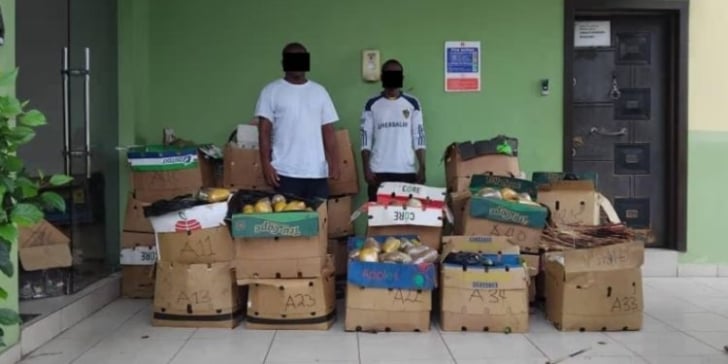The Narcotics Control Commission (NACOC) has intercepted a major consignment of suspected cannabis at the Swissport Terminal in Accra, exposing yet another sophisticated attempt to smuggle drugs out of Ghana.
The operation, carried out on Friday, July 5, resulted in the seizure of 738 compressed parcels of suspected cannabis concealed in 40 boxes falsely labelled as “assorted food items.” The shipment, which was destined for the United Kingdom, has once again highlighted Ghana’s vulnerability as a strategic transit point for narcotics en route to Europe.
According to NACOC, the successful interception followed weeks of intensive surveillance and intelligence-led operations. Two individuals have been arrested in connection with the seizure and are currently assisting with investigations. However, two other key suspects — Lincoln Nii Okaija (born March 27, 1979) and Kate Davidson, also known as “Esi” — remain at large. Authorities have declared both wanted and are appealing to the public for credible information that could lead to their arrest.
Cannabis trafficking continues to be one of the most pressing challenges confronting Ghana’s drug enforcement agencies. NACOC’s 2022 drug seizure report revealed a dramatic spike in narcotics arrests and confiscations, with over 59,900 kilograms of drugs seized in that year alone — a fourfold increase compared to 2021. While substances like cocaine and heroin often dominate headlines, cannabis remains the most frequently intercepted drug due to its widespread cultivation and its central role in regional and international smuggling networks.
In a separate but related enforcement action on June 24, NACOC conducted a major raid in Akyem Oda and Akroso in the Eastern Region. Acting on covert intelligence, the Commission apprehended 14 individuals believed to be involved in the possession and distribution of narcotics. The operation also led to the closure of three licensed chemical shops found to be illegally dispensing controlled and unregistered pharmaceutical drugs. Items confiscated during the raid included large quantities of cannabis and popular codeine-based cough syrups such as “red,” which are often abused in local communities.
Ghana continues to work closely with international partners, particularly the United Kingdom, to dismantle drug trafficking networks. Joint efforts include information sharing, coordinated enforcement actions, and institutional capacity building to improve border security and intelligence gathering.
Under Ghana’s Narcotic Drugs (Control, Enforcement and Sanctions) Act, 1990 (PNDCL 236), trafficking in narcotics without lawful authority carries a minimum prison sentence of 10 years. NACOC has reaffirmed its commitment to rooting out drug-related criminal activity and has called on Ghanaians to play an active role in the fight against narcotics.
“The public must stay vigilant and work with law enforcement to report suspicious activities. Combating drug crime is not just about arrests — it’s about protecting our communities, safeguarding public health, and securing the nation’s future,” the Commission said in a statement.


